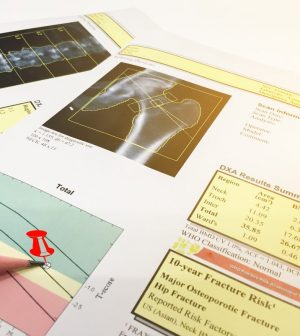- Could Your Grocery Store Meat Be Causing Recurring UTIs?
- Are You Making This Expensive Thermostat Error This Winter?
- Recognizing the Signs of Hypothyroidism
- 10 Strategies to Overcome Insomnia
- Could Artificial Sweeteners Be Aging the Brain Faster?
- Techniques for Soothing Your Nervous System
- Does the Water in Your House Smell Funny? Here’s Why
- Can a Daily Dose of Apple Cider Vinegar Actually Aid Weight Loss?
- 6 Health Beverages That Can Actually Spike Your Blood Sugar
- Treatment Options for Social Anxiety Disorder
Researchers Discover New Hormone That Builds Strong Bones

A newly discovered hormone could help fight osteoporosis and quickly heal broken bones, researchers say.
The research team identified Maternal Brain Hormone while trying to figure out why the bones of breastfeeding women remain relatively strong, even as calcium is stripped from the bones to support milk production.
It turns out that the neurons of breastfeeding moms secrete Maternal Brain Hormone, and that this hormone protects their bone health.
Bone mass and strength increased in both female and male mice when researchers boosted their levels of Maternal Brain Hormone, results show.
Further, the hormone increased healing in bone fractures among elderly mice, essentially causing the broken bone to heal at a rate similar to that of a young mouse.
“We’ve never been able to achieve this kind of mineralization and healing outcome with any other strategy,” researcher Thomas Ambrosi, an assistant professor at the University of California-Davis, said in a news release. “We’re really excited to follow it up and potentially apply (the hormone) in the context of other problems, such as regrowing cartilage.”
Women are at high risk of osteoporosis during menopause because of declining levels of the female sex hormone estrogen, which normally promotes bone growth, researchers said in background notes.
Estrogen levels are also low during breastfeeding, but those women are resistant to osteoporosis and broken bones, researchers said. This suggested that something other than estrogen promoted bone growth among them.
Researchers eventually came across a hormone called CCN3 in a small brain region of lactating female mice. Without production of the hormone, these lactating mice rapidly lost bone and their babies began to lose weight – indicating that the hormone played a prominent role in maintain bone health.
The research team gave CCN3 a new name, Maternal Brain Hormone. They found that in some female mice who were very old or without estrogen, the hormone was able to more than double bone mass.
The findings were published July 10 in the journal Nature.
Researchers plan to test the effectiveness of the hormone in treating a variety of bone conditions.
“Bone loss happens not only in post-menopausal women but often occurs in breast cancer survivors that take certain hormone blockers; in younger, highly trained elite female athletes; and in older men whose relative survival rate is poorer than women after a hip fracture,” said senior researcher Holly Ingraham, a professor of cellular molecular pharmacology at the University of California, San Francisco (UCSF).
“It would be incredibly exciting if CCN3 could increase bone mass in all these scenarios,” Ingraham concluded in a UCSF news release.
More information
The National Institute on Aging has more about osteoporosis.
SOURCE: University of California, San Francisco, news release, July 10, 2024
Source: HealthDay
Copyright © 2026 HealthDay. All rights reserved.










